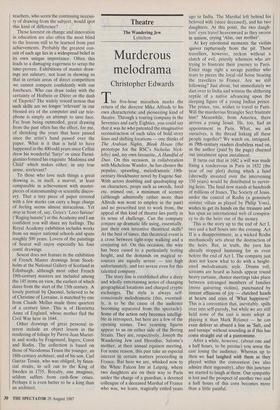Theatre
The Wandering Jew Lyttelton
Murderous melodrama
Christopher Edwards
This five-hour marathon marks the return of the director Mike Alfreds to his own characteristic and pioneering kind of theatre. Through a touring company in the Seventies and early Eighties, you could say that it was he who patented the imaginative reconstruction of such tales of bold, story lines and shifting locations — one thinks of The Arabian Nights, Bleak House (the prototype for the RSC's Nicholas Nick- leby) and, my own favourite, A Handful of Dust. On this occasion, in collaboration with Michelene Wandor, he has chosen the popular, sprawling, melodramatic 19th- century blockbuster novel by Eugene Sue. With actors doubling and quadrupling up on characters, props such as swords, food etc. mimed out, a minimum of scenery (although admittedly rather more than Alfreds was wont to employ in the past) and no prescribed text to work from, the appeal of this kind of theatre lies partly in its sense of challenge. Can the company conjure up dramatic life using, essentially, just their own inventive theatrical skills? At the best of times, this theatrical event is a cross between tight-rope walking and a conjuring act. On this occasion, the wire has been raised to a particularly testing height, and the demands on magical re- sources are equally severe — too high unfortunately, and too severe even for this talented company.
The story line is established after a dizzy and wholly entertaining series of changing geographical locations and charged cryptic exchanges. The style is always self- consciously melodramatic (this, eventual- ly, is to be the cause of the audience becoming separated from, the spectacle). Some of the action only becomes intelligi- ble in retrospect, but here are a few of the opening scenes. Two yearning figures appear to us on either side of the Bering Straits. They are, respectively, Joseph the Wandering Jew and Herodias, Salome's mother, at their annual equinox meeting. For some reason, this pair take an especial interest in certain matters proceeding in France. But here we are, whisked now to the White Falcon Inn at Leipzig, where two daughters are on their way to Paris under the charge of a guardian, a devoted colleague of a deceased Marshal of France who was, we learn, tragically exiled years ago to India. The Marshal left behind his beloved wife (since deceased), and his two daughters. At this point, the two daugh- ters' eyes travel heavenward as they swoon in unison, crying 'Alas, our mother'.
At key emotional moments the violins quiver rapturously from the pit. These travellers, however, reckon without a clutch of evil, priestly schemers who are trying to frustrate their journey to Paris. Enter stage right a savage panther who tears to pieces the loyal old horse bearing the travellers to France. Are we still following? Just about, but immediately we dart over to India and witness the slithering reptile of a native advancing upon the sleeping figure of a young Indian prince. The prince, too, wishes to travel to Paris. Will the murderous Strangler Sect frustrate him? Meanwhile, from America, there arrives a young Jesuit. He, too, had an appointment in Paris. What, we ask ourselves, is the thread linking all these people together? We watch on, intrigued, as 19th-century readers doubtless read on, as the author (paid by the page) churned out instalment upon instalment.
It turns out that in 1682 a will was made fixing a rendezvous in Paris in 1832 (the year of our plot) during which a fund (shrewdly invested over the intervening 150 years) would be distributed to surviv- ing heirs. The fund now stands at hundreds of millions of francs. The Society of Jesus, under the control of Rodin (a genuinely sinister villain as played by Philip Voss), wishes to get its hands on the treasure and has spun an international web of conspira- cy to do the heirs out of the money.
This is the story up to the end of Act I, two and a half hours into the evening. Act II is a disappointment, as a wicked Rodin mechanically sets about the destruction of the heirs. But, in truth, the yarn has already stopped humming for us even before the end of Act I. The company just does not know what to do with a height- ened melodramatic style. Drums roll, screams are heard as hands appear round heavy curtains, chance meetings take place between estranged members of families (more quivering violins), punctuated by instant effusions of joy — clutched hands at hearts and cries of 'What happiness!' This is a convention that, inevitably, spills over into self-parody, but while we are still held none of the cast is more adept at playing it than Mark Rylance — he can even deliver so absurd a line as 'Salt, cod and turnips' without sounding as if this has come straight out of a pantomime.
After a while, however, (about one and a half hours, to be precise) you sense the cast losing the audience. Whereas up to then we had laughed with them as they played within the convention (we also admire their ingenuity), after this juncture we started to laugh at them. Our sympathy is lost and the prospect of another two and a half hours of this corn becomes more than a little painful.










































 Previous page
Previous page